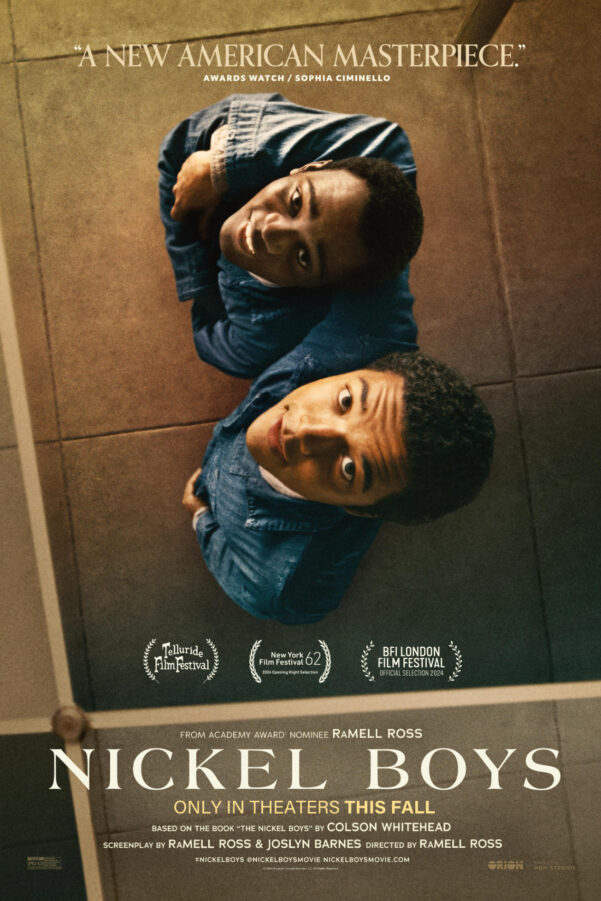Nickel Boys

To truly have walked in another man’s shoes, is it better to have seen his life reflected in his eyes, or through them? It’s a question that Nickel Boys, RaMell Ross’s shimmering adaptation of Colson Whitehead’s novel of the same name, seeks to explore. We begin with Elwood Curtis (first Ethan Cole Sharp, then Ethan Herisse), a bright, inquisitive high school student who lives with his grandmother (Aunjanue Ellis-Taylor) in 1962 Florida. Still, our introduction to Elwood’s world is anything but conventional. As his grandma pulls him into a consoling embrace, DP Jomo Fray’s camera is pressed softly into her shoulder. Later, when sat with his girlfriend in a photobooth, the audience sits with him, her face shyly turned to lock eyes with ours. Sitting in class, Fray’s camera darts anxiously amongst the shoulders of classmates, pausing to lock eyes with the firm but fair teacher. For much of Nickel Boys, the camera is Elwood, and to watch the film is to wander through a fragmented haze of memory and dream. The effect is bracingly immediate, at least to start.
When an elderly white man approaches Elwood after a police stop, he buries his walking stick into his exposed stomach, prodding almost experimentally. In the hot prickle of discomfort this moment brings, we feel that a shadow of its queasy, invasive intimacy has briefly been transposed to us. It’s a discomfort that will only increase as, after an unjust turn, we find ourselves sat with Elwood in an altogether different classroom, his eyes locked with an altogether different teacher. “It’s up to you how much time you spend with us,” the master of Nickel Academy (Hamish Linklater) flatly declares, and while we know not to believe it (Nickel is modelled off of Dozier School for Boys, the Florida “reform school” that housed a stream of violent abuses and murders from 1900 to 2011), through Elwood’s eyes we feel a tremor of the hope to which he now clings. Only when Elwood strikes up a close bond with Turner, a more jaded Nickel veteran (Brandon Wilson), do we step outside of him. Turner’s viewpoint will be ours too, and upon seeing Elwood’s face through the eyes of another, the hope in him is much harder to see.
Nickel Boys is rarely less than transporting as a sensory experience, and always fascinating as a study in the power of perspective to strip the sheen of spectacle from onscreen brutality. Still, as Ross and Fray float from the POVs of Elwood, Turner, an older, traumatised Elwood (Daveed Diggs) and a surfeit of grainy archival material, it can feel as though our emotional foothold was lost somewhere along the way. While technically in every scene, Ross’s formal approach is such that his two leads are only intermittently present in their own stories, always secondary to the tightness of the filmmaker’s formal control. When the stakes ought to be intensifying, it feels as if the director is still instructing us on how to look at the story when they ought simply to be telling it.
Still, Nickel Boys’ bold approach recaptures both its potential for raw immediacy and fragmentary subjectivity – indeed, the power to place us in a character’s body and mind all at once – where it counts. The film’s climactic revelations arrive in a nightmarish headrush, the past and future converging with a harshness that stings for a long while. Much as in Elwood’s own recollections, it is in retrospect that the sights and sounds of Nickel Boys gain much of their haunting potency.
Thomas Messner
Read more reviews from our London Film Festival coverage here.
For further information about the event visit the London Film Festival website here.
Watch the trailer for Nickel Boys here:

























Facebook
Twitter
Instagram
YouTube
RSS